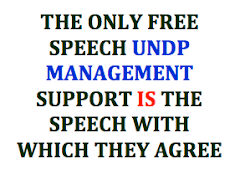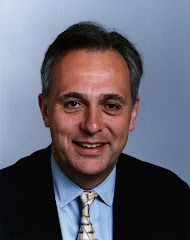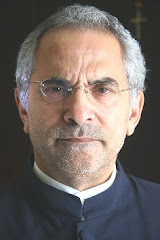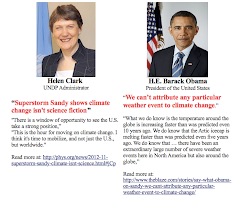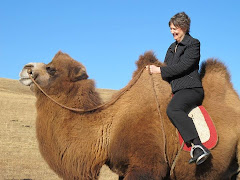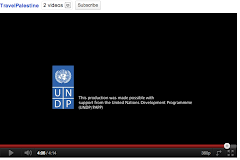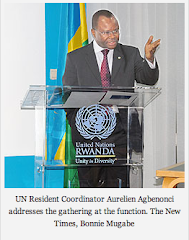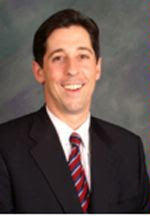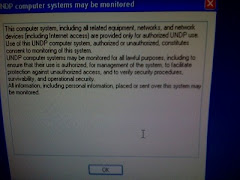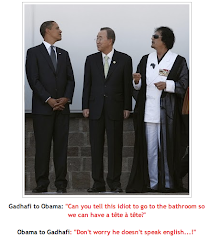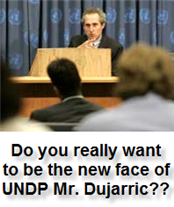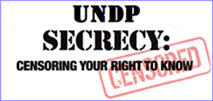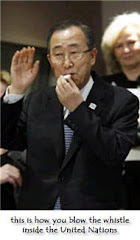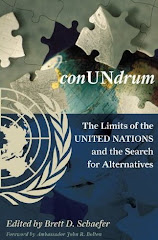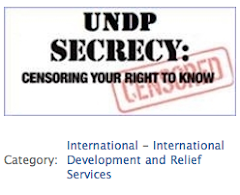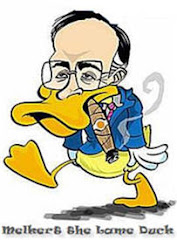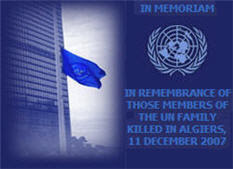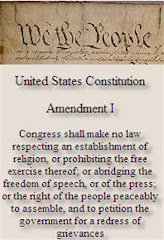CLICK HERE TO READ STORY ON GENEVALUNCH.COM
Centre for Humanitarian Dialogue charges a former director with CHF3.8m fraud (update)
Update 17:40 (video) Geneva, Switzerland (GenevaLunch) - The Centre for Humanitarian Dialogue (CHD) an international mediation organization, announced Saturday 28 August that it has been the victim of a CHF3.8 million fraud engineered, it says, by its former director of finance and administration, who held several other international posts before joining the Centre.
“A number of different schemes” were used, since 2004, to carry out the theft, says the organization.
Executive Director Martin Griffiths, who has headed the the CHD since it was created in 1999, has stepped down, “because he felt morally responsible,” the official announcement notes. “The Board accepted the resignation in order to put in place a new senior management. In recognition of his experience and knowledge of mediation, the Board has asked Martin Griffiths to dedicate his time fully to the mediation activities of the organization.”
Griffiths, a lawyer, worked for the UN as director of the Department of Humanitarian Affairs (which became OCHA) in Geneva and from 1998 to 1999 he was deputy to the UN Emergency Relief coordinator in New York, when he was also the UN regional coordinator in the Balkans (1999) with the rank of UN assistant secretary-general.
KPMG brought in to determine extent of fraud
The fraud was discovered in June 2010 by senior management, at which point the CHD hired audit firm KPMG to investigate. The announcement comes six weeks after the former finance director was stripped of his right to sign for the organization. Criminal charges have now been filed against the former director, and the group is “taking steps to recover the stolen sum.”
The organization is funded by several governments, private foundations and philanthropists, all of which have been informed about the fraud.
The former director, who cannot be named under Swiss law, lists, on online networking sites and as part of his CV, work done with a number of organizations, in Geneva, the UK and the US.
These include the World Bank and the IMF as an external auditor, finance positions with the Asian Development Bank, the British Embassy in Kathmandu, Arthur Andersen and, on one site, a fictitious trucking company. He appears to have served as an outside expert involved in approving funding for at least one international organization in the past year and has participated in a tax justice network as well as a corporate governance organization, both of which hold discussions on fraud.
Centre involved in several key African, Asian conflicts
It describes itself as an independent body that is “dedicated to improving the global response to armed conflict. It attempts to achieve this by mediating between warring parties and providing support to the broader mediation community. The HD Centre is driven by humanitarian values and its ultimate goal to reduce the consequences of violent conflict, improve security, and ultimately contribute to the peaceful resolution of conflict. It maintains a neutral stance towards the warring parties that it mediates between.”
Major mediation projects in which it is involved currently are in Somalia, Sudan, Kenya and the Central African Republic in Africa, as well as the Philippines NDF, Philippines Nindanao and Myanmar/Burma.
In 2010, the HD Centre brokered a historic agreement between the most heavily armed opposition movement in Darfur, the JEM, and the United Nations on the protection of children caught up in the conflict.
It has been active in Somaliand’s elections, training 600 national monitors/observers as well as working on resolving election disputes.
The official notice about the fraud notes that “The HD Centre has financial policies and procedures in place which govern financial transactions and accounting and which fully conform to generally accepted standards including Swiss legal requirements for Foundations. It has also received clean external audits every year since its establishment. As a result of this fraud, the HD Centre has already begun putting in place additional measures to strengthen control and compliance systems.”
Angelo Gnaedinger, director general of the International Committee of the Red Cross (ICRC) until 30 June 2010 has been appointed interim executive director, effective 6 September, while the organization undertakes a search for a new executive director.
Video, CHD, work in the Philippines
POSTED BY ELLEN WALLACE ON 30 AUGUST 2010 AT 15:28, LAST UPDATED ON 3 SEPTEMBER 2010 AT 15:39 | PERMALINK
Wednesday, May 30, 2012
Wednesday, May 23, 2012
U.N. investigators 'seriously compromised' by relationship to management bosses, report charges
Published May 23, 2012
| FoxNews.com
The people who are paid to root out waste, fraud, corruption and wrongdoing in the sprawling United Nations are often not qualified to do their jobs, and are hampered by insufficient funding and potential conflicts of interest because the very people they are investigating control their careers and budgets, according to a report by U.N. experts on how the world organization investigates itself.
Very often, the U.N.’s internal investigators are part of the management structure they may be called on to probe, the report adds. Nor do most of the U.N.’s array of funds, programs, agencies and other organizations have any consistent means of making sure that investigations are followed up when wrongdoing is discovered.
The report’s stark conclusions amount to a renewed call for accountability by one of the few independent groups of investigators in the U.N., a small conclave of top-level experts based in Geneva that is known as the Joint Inspection Unit, or JIU.
The JIU inspectors are the only group of U.N. investigators expressly mandated to examine on a system-wide basis the effectiveness of the proliferating array of funds, agencies, programs and other organizations that make up the expanding U.N. universe, and even they have come under increasing pressure from U.N. Secretary General Ban Ki-moon to toe an organizational line.
When queried by Fox News, JIU officials declined to comment at all on their report.
Click here for the JIU report
The 31-page document, a follow-up on several previous efforts over the past decade to examine the U.N.’s self-policing efforts, was intended to appear in 2011 -- and is labeled that way on its front page -- but the final version was not even created until February 2012.
The JIU inspectors examined a total of 21 U.N. organizations, by no means an inclusive list. One reason is that some of the U.N.’s most important programs are still considered, for investigation purposes, as part of the U.N. Secretariat. For example, there is no separate mention in the document of one of the most important and ambitious U.N. bureaucracies, which is bidding fiercely to become a bigger player in matters of “global environmental governance” in the years ahead.
That organization is the United Nations Environmental Program, or UNEP, which, according to various press reports, has the support of France, among other countries, to become a kind of environmental super-agency in the wake of the upcoming U.N. Rio + 20 global summit on “sustainable development,” which begins June 21. The reason: UNEP makes use of investigators from the U.N. Secretariat instead.
“It seems to us sensible and a saving of taxpayers’ money to draw on the capabilities of the U.N. Secretariat rather than having or setting up a separate system,” a UNEP spokesman told Fox News.
Maybe not. A report three years ago by the Secretariat’s watchdog organization, the Office for Internal Oversight Services (OIOS), noted that under the arrangement, the United Nations Environmental Program had just one auditor and one assistant to inspect its operations and a number of multilateral agreements under UNEP's purview. The OIOS document estimated that it would take 17 years for the auditor to look over just the high-risk areas already identified in UNEP's work.
The same issue applied to the United Nations Human Settlements program, known as UN-Habitat, where OIOS estimated that it would take the solo auditor 11 years to cover the high-risk areas in a $250 million Habitat budget.
Last year, a confidential examination of UNEP by OIOS, obtained by Fox News, revealed that UNEP had repeatedly ignored its own financial rules, bypassed internal quality control agencies, didn’t know how its money is spent or even who it might be dealing with when it comes to hundreds of corporate, public and non-governmental partners that are key to fulfilling its mission.
What the JIU inspectors have to say about the U.N.’s other investigations efforts closely parallels what they recently said about the people who are entrusted to examine the U.N.’s books: They are over-stretched and too much under the thumb of the managers they are likely to be investigating, who control investigation budgets, human resources and even the immediate careers of investigators who could be policing their decisions.
“As currently set up,” the JIU inspectors declare, “no oversight entity is free to decide on its budgetary requirements; oversight entities are subject to the same budget policies as any other entity within the Secretariats. The Inspectors believe this seriously compromises the independence of the oversight function, including investigations. “
And in some U.N. organizations, the report says, “no investigation can be opened in the absence of the executive head’s explicit approval or specific instruction.”
In other words, the people who may be held ultimately accountable for their organization’s failings get to decide whether those failings will be exposed or not.
Even when investigators get to do their jobs, the report says, “executive heads are able to make use of the investigation reports’ findings, conclusions or recommendations in the way they judge best, which, in a worst-case scenario, could include concealing evidence and/or burying the findings.”
And if the wrongdoing includes criminal activity, the report adds, the “executive heads” of the organizations get to decide whether local police or other authorities will even be involved.
When it comes to encouraging staffers to report wrongdoing, the inspectors indicate that U.N. organizations can also be less than forthcoming. In one unnamed case -- involving a “large” U.N. organization, the report says security cameras are installed “throughout its internal oversight office,” making a record of whoever comes inside.
“This is a major deterrent to staff wishing to report and discuss wrongdoing with the investigators,” the report dryly states. “The Inspectors believe the cameras should be deactivated during business hours.”
Atop all that, there is something approaching systemic anarchy when it comes to investigative standards. Some smaller and more technical U.N. organizations, the report notes, don’t set aside any money for the investigation of wrongdoing, and have the option of “outsourcing” investigations -- though how is unspecified.
Both the JIU inspectors and U.N. staffers are concerned that such investigations conducted by “non-professional investigators and/or entities which are not independent but are part of management, can result in conflicts of interest, information not being handled properly, an uneven application of standards, and problems with due process, as well as cases being “dropped” or taking undue time to complete.”
The solutions that the JIU experts offer for most of the U.N.’s investigative problems are also not new: greater autonomy from top management, including the right to pursue investigations without permission; more financial independence; and a direct reporting line to external oversight organizations -- independent auditing committees, for example -- as well as to bosses who might take a dislike to the investigators’ findings.
The experts, however, do have one fairly dramatic new idea on offer to deal with all the gaps, uneven standards, professional disparities and other problems of the deeply fragmented system -- although, in typical U.N. fashion, it is less a solution than an invitation to a drawn-out bureaucratic process.
They call on Secretary General Ban to pull together an “inter-agency task force,” under the auspices of a U.N. body that includes the heads of 29 U.N. organizations to “develop options” for the creation of a single U.N. system-wide investigative unit, which would then be presented to the U.N. General Assembly and other legislative bodies for consideration.
The JIU suggests that the “options” be assembled by the end of 2013. A spokesman for Ban’s office said that the secretary general wouldn’t be commenting on the idea until this fall.
George Russell is executive editor of Fox News and can be found on Twitter@GeorgeRussell
Click here for more stories by George Russell
Darshak Shah's wife - running for UNFCU Board of Directors (a year ago Darshak couldn't make it) - what's in it for Darshak that wants at any cost the UNFCU?
Aruna Thanabalasingam
| Residence | New York, USA |
| Agency and Department or Office | UNICEF, Deputy Director of Human Resources |
| Educational Background | ||
| Year of Graduation | Name of School | Degree |
| 1984 | University of Essex, UK | BA (Honors), Policy Making and Administration |
| 1985 | University of Lancaster, School of Management and Organizational Sciences, UK | Postgraduate Diploma, Business Analysis |
| 1993 | Columbia University, NY USA | MA, Organization Psychology |
| United Nations Service | ||
| Start date/ end date | Company | Position Held |
| 2001 - 2003 | UNDP | Chief of Recruitment, OHR |
| 2003 - 2005 | UNDP | Chief, Business Advisory Services, OHR |
| 2005 - 2007 | UNDP | Deputy Director, OHR and Chief, Business Advisory Services |
| 2007 - Present | UNICEF | Deputy Director, DHR, Strategic Talent Management |
| Non-UN Experience | ||
| Start date/ end date | Company | Position Held |
| 1988 - 1990 | KPMG, Kenya | Managing Consultant, Executive Search |
| 1990 - 1993 | Citibank, Avon Products, UNDP; Catalyst | Consultant |
| 1993 - 1998 | PWC, New York | Manager, Human Resources |
| 1998 | Deloitte Consulting, New York | Manager, International Recruitment |
| 1998 - 2001 | KPMG, East Africa | Director, Human Resources Consulting Practice |
| Experience/Qualifications relevant to candidacy |
| I am a seasoned HR Professional with over 20 years of experience both in the private sector and UN system. I have a strong academic background in the behavioral sciences and a good grounding in policy and advocacy, as well as a sensitivity to people matters. Therefore, I believe I can add value as a member of the UNFCU Board, bringing to the table my diversity of experiences, and understanding of the contexts and needs of members both in the developing and developed world. |
| Personal Statement |
| I believe in the mission of UNFCU: “Serving the People Who Serve the World” by enriching members’ lives. Additionally, I strongly believe that in this current volatile and challenging environment, UNFCU has an opportunity to make a difference for its members. I would like to be part of the team that effects the change where appropriate and necessary to facilitate and impact the lives of members. The diversity of my background, experiences both in the private sector and the UN system, my professionalism, sound judgment and people intelligence are elements I can contribute as a member of the UNFCU Board. |
Monday, May 14, 2012
WallStreetJournal: UNDP in Afghanistan involved in yet another scandal - will Jens Wandel clean up house (while Darshak Shah's wife runs for UNFCU top board position?)
FOR FULL ARTICLE CLICK HERE TO READ IT ON WALL-STREET JOURNAL
U.N. Defends Afghan Police Fund as Donors Seek Probe
By NATHAN HODGE, YAROSLAV TROFIMOV and STEPHEN FIDLER
KABUL—International donors called on Sunday for an inquiry into potential mismanagement of the United Nations-administered trust fund that helps pay for Afghanistan's fledgling police force, even as the U.N. reiterated its support for the program and denied the accusations.
The Wall Street Journal reported late last week that the Monitoring and Evaluation Committee, an anticorruption group composed of high-level Afghan and international officials, expressed concerns about the Law and Order Trust Fund for Afghanistan, or Lotfa. Administered by the U.N. Development Program, Lotfa covers salaries, benefits and other operating costs for the Afghan National Police.
The issue is sensitive because Lotfa—established in 2002 as a result of international donor concerns that the Afghan government was at the time unable to properly disburse the money itself—is supposed to be an example of probity.
Most of the money in the fund comes from the U.S., European nations and Japan. "We will request a detailed investigation and accountability," a senior Western official said Sunday. "There is zero tolerance of mismanagement and corruption."
An American official in Kabul added that the U.S. has strongly supported the work of the committee that highlighted the problems at Lotfa. "We encourage the UNDP to be responsive to the concerns raised by the MEC that have been reported on," the U.S. official said.
In Brussels, a spokesman for the European Union's External Action Service, which is responsible for foreign aid, said the issues raised by the Journal article "are indeed a matter of serious concern." The EU would follow up with the UNDP "to ensure all necessary actions are taken to restore donor confidence in the management of Lotfa," he said.
In a detailed response to the Journal's article, the UNDP on Sunday denied allegations that the fund was vulnerable to fraud, and said specific incidents of possible corruption, raised by apparent whistleblowers in documents reviewed by the Journal, were incorrect.
The U.N. mission in Afghanistan added that a recently conducted financial audit of Lotfa by KPMG found no financial irregularities. "I am confident that comprehensive steps to ensure transparency and oversight are being taken by UNDP to further its efforts to contribute to a robust and professional police force in Afghanistan," said Michael Keating, the U.N. mission's deputy head.
In a finding issued to donors Friday, the Monitoring and Evaluation Committee said Lotfa "has been and will continue to be vulnerable to corruption," even though the fund is crucial to Afghanistan's security.
"The lack of proper oversight and accountability of Lotfa has been flagged by a number of institutions as insufficient for a trust fund of this size and importance," the finding says. "UNDP Country Office has received internal complaints and is conducting its own integrity checks and financial audits which need to be published and made public."
The committee also called for the fund's management to publish the results of a recent internal audit, which UNDP officials said showed no evidence of irregularity.
On Sunday, Ashraf Ghani, Afghanistan's presidential adviser who oversees the transition of security to Afghan control, told reporters in Kabul that the U.N. needs to overhaul its auditing system. "Its auditing system is of a different century," he said.
Among the internal complaints raised within Lotfa were suspicions that the program may have overpaid for office supplies and equipment, or paid worker salaries for positions that went unfilled, according to the whistleblower documents reviewed by the Journal.
Satinder Bindra, the UNDP's director of communications, said in a statement Sunday that the agency "has a zero-tolerance policy towards any form of mismanagement or corruption for its entire country program in Afghanistan," and added that it was "committed to diligently following up on" the committee's recommendations.
Responding to specific allegations of the misallocation of funds, the UNDP said it found no evidence of wrongdoing. A luxury furniture set flagged in one internal document as possibly not being documented or delivered was "procured with full procedural checks and are still being used by the head of the Afghan Border Police," the UNDP said.
An $800 paper shredder mentioned in a report as possibly being purchased for above market price "was in line with our procurement policy and was only approved after the project justified its need for a more robust product," the UNDP said.
The UNDP acknowledged in its response that it was aware of the risk of "no-show" workers at Afghanistan's interior ministry who may still be paid on contract by Lotfa.
"Precisely because we are fully aware of this risk, a system was established for all the staff in the Ministry of Interior in key departments to work under contract," the statement said. "Payments to staff are only processed after the examination of monthly attendance sheets submitted to supervisors, who sign off on the entire process."
The Afghan interior ministry didn't immediately respond to a request for comment.
Labels:
afghanistan,
corruption,
darshak shah,
helen clark,
jens wandel,
police,
scandal,
undp
Subscribe to:
Posts (Atom)
